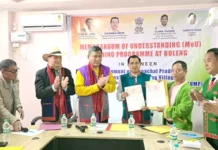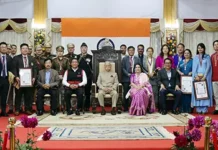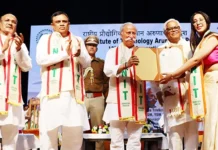[ Jomjar Padu ]
How safe are our hospitals if patients die and doctors are attacked while on duty? This urgent question has gripped Arunachal Pradesh after a series of shocking incidents exposed serious flaws in the state’s healthcare system.
Public outrage intensified when reports emerged of a young woman’s death during a routine Caesarean section. The family pointed to medical negligence and highlighted systemic weaknesses that should never exist in the state’s premier medical institute.
The crisis escalated further when two doctors on duty were brutally attacked inside the hospital ward. One doctor was struck multiple times with an iron rod, while the other sustained serious injuries while trying to intervene. The attack shocked the public and raised urgent concerns about the safety of healthcare workers and the security of hospital premises.
In the face of such challenges, healthcare workers took action by temporarily suspending non-emergency medical services. Their protest sought to press the government into taking swift steps to ensure the safety of doctors, nurses, and patients, while demanding urgent reforms in hospital security and patient care practices.
These events exposed critical gaps in security measures, supervision of medical procedures, and accountability mechanisms within hospitals. Without immediate improvements, such incidents risk becoming commonplace, threatening the very purpose of medical institutions.
To address the ongoing crisis, a balanced and practical approach is necessary, focusing equally on the safety of healthcare workers and the elimination of medical negligence. Hospitals must urgently improve security measures by deploying trained security personnel and installing surveillance systems, ensuring a safe working environment for doctors, nurses, and patients alike. At the same time, clear supervision protocols must be enforced, especially for critical medical procedures, to guarantee that only qualified specialists perform surgeries and oversee junior staff. Parallelly, there must be strict accountability mechanisms in place: independent medical oversight bodies should investigate all complaints of negligence transparently and efficiently, while hospitals must establish accessible grievance systems to empower patients and staff to report malpractice without fear of retaliation. Importantly, any verified instances of medical negligence must result in firm disciplinary or legal action, serving both as a deterrent and as a step towards improving the overall quality of patient care.
By implementing measures that protect medical professionals while holding negligent practices accountable, the system can begin to rebuild trust and operate effectively for the wellbeing of all.
The people of Arunachal deserve a healthcare system they can trust – one where patient care is never compromised, medical professionals work in a safe environment, and accountability is upheld. Empty promises and temporary measures will no longer suffice. The time for practical, coordinated reform is now. (The contributor is a student of the National Law University, Cuttack)



